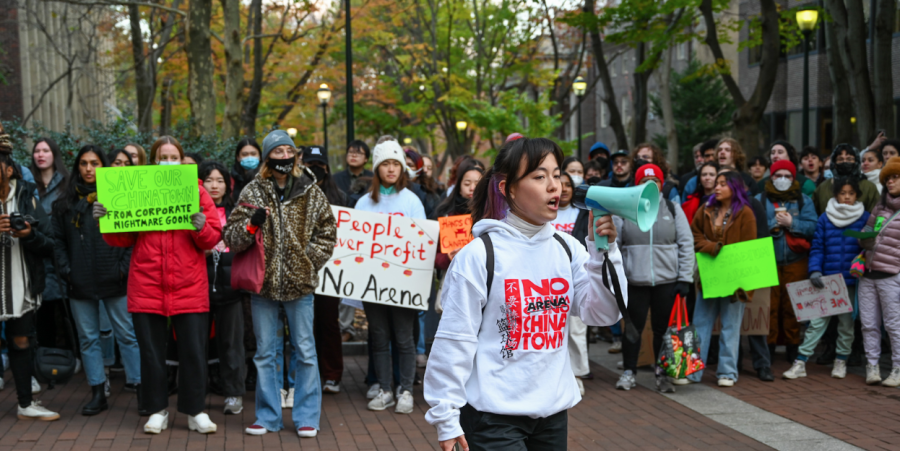Philly in Peril: 76ers & Chinatown
Philadelphia, clad with green banners down Broad Street, boasts of successful sports teams supported by impassioned fan bases. Between Arch and Vine, Chinatown rests a few blocks away, peppered with red and gold accents. In recent headlines, these two fundamental communities of Philadelphia have met in conflict.
In July 2022, the Philadelphia 76ers, known as the Sixers, announced a $1.3 billion project for a new stadium to be funded by private investors. With their contract at Wells Fargo Center ending in 2031, the basketball team wanted more scheduling freedom since they currently share a space with the Flyers and Wings. The proposed stadium location, between 10th and 11th on Market Street, would revitalize the adjacent Chinatown neighborhood post COVID-19, the Sixers management reasoned.
However, the Chinatown community has reacted with forceful opposition. Initially, community leaders criticized a lack of transparency with the proposal, claiming that residents were not consulted or given proper notice. Even after going public with their plans, the Sixers’ development meetings were allegedly invitation only, closed to locals – a majority of whom are against the construction.
Fundamentally, residents fear a loss of cultural identity. The arena’s six-year construction period will completely shut down Filbert St. between 10th and 11th, cutting off valuable consumer revenue for businesses in the area. The finished stadium would further pose costs for the working class households in Chinatown, bringing more expensive housing, commercial property, and parking fees, to name a few. Most residents could not survive such heightened costs, regardless of any increased tourism that arena developers promise. In addition to monetary implications, residents fear a potential onslaught of violence, with Asian American Pacific Islander (AAPI) hate crimes becoming especially prevalent in recent times.
The Sixers stadium is not the first large development that the community has faced. Chinatown lost territory to the Vine Street Expressway and Pennsylvania Convention Center in the 1900s, and activists have battled plans for a Phillies stadium, casino, and federal prison as well, fearing a loss of culture.
Their apprehension is not without merit, as gentrification in Washington D.C. has proved. When the Capital One Arena opened in 1997, D.C.’s Chinatown was struggling. Instead of bringing economic wellbeing to the neighborhood as developers assured, the new establishment skyrocketed prices to intolerable levels, forcing locals to move out. Decades later, the once historically rich neighborhood is near-vacant of authentic Asian businesses – a fate that Philadelphians hope to avoid.
Undeniably, sports are a strong source of pride for our city. Fans flock to watch Harden, Harris, and Co. shoot goals every week at sold-out games. The Sixers are entertaining, impressive, and deserving of an independent home to practice freely at; however, that place can be virtually anywhere in the city. The proposed construction in Chinatown is more than an issue of inconvenience for residents; it is an intrusion on a close-knit community of individuals trying to make a living. The proposed ‘76 Place’ is already a place of immigrants, whose presence is indispensable. Legislators, citizens, and everyone who has snapped a photo in front of the Friendship Gate must advocate for this community to remain undisturbed.

Vivian is a senior excited for another year with the Banner. She loves reading and writing about politics and pop culture. To supplement these interests,...


